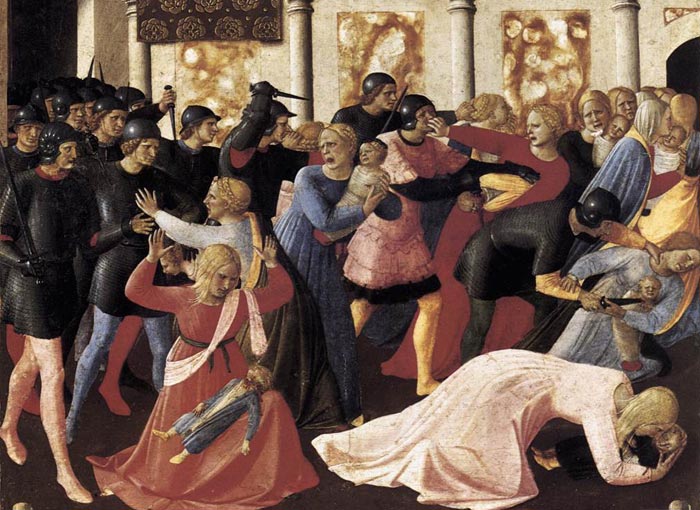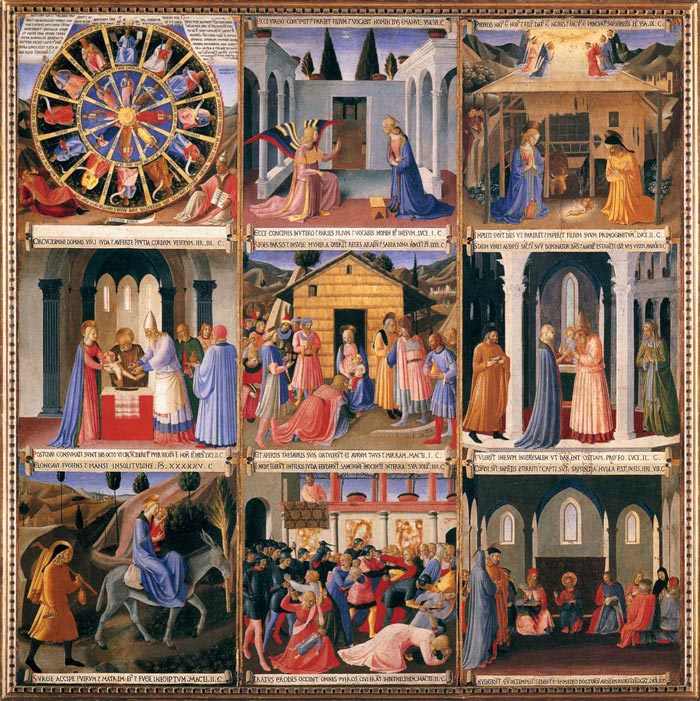It is Christmas, and the Church spares nothing in rejoicing at the arrival of the Child of Bethlehem. But amid the light and joy of the season, neither does the Church fail to remind us just what it was that the Christ-child came to accomplish.
St. Stephen, the protomartyr, whose death by stoning is recorded in Acts, is celebrated on December 26. On December 27, the Church celebrates St. John the Apostle, who, though he did not die a martyr’s death, according to tradition, miraculously survived several attempts on his life. If Stephen was a martyr in will and deed, as the old catechesis has it, then John was a martyr in will, though not in deed.
And today, the 28th of December, the Church marks the Feast of the Holy Innocents, who were martyrs in deed though not, being infants, in will.
The horrific slaughter of children at the command of King Herod is a jarring contrast to the peace and innocence of the birth of Jesus we celebrated just three days earlier.
St. Augustine, at the end of the fourth century (right around the time the Feast of the Holy Innocents was taking its permanent place in the liturgical year, as it happens) reflected on this juxtaposition of Herod’s crime and Christ’s arrival:
Herod was troubled, as if Christ had come to seek and find an earthly kingdom. The lion of heaven was born, and the little fox of the earth was troubled. The Lord said of Herod, Go, tell that fox. (Luke 13:32) Because it was troubled, what did it do? It slaughtered infants. What did it do? It slaughtered infants in place of the infant Word. They were made martyrs by the shedding of their blood, before they could confess the Lord with their mouths. And these are the first fruits that Christ sent to the Father. An infant came, and infants went; an infant came to us, infants went to God. From the mouths of infants and sucklings you have perfected praise. (Psalms 8:2)
Around the same time Augustine was preaching in North Africa, St. John Chrysostom (not yet Archbishop of Constantinople) was preaching on a very similar theme in Antioch.
Chrysostom emphasized Herod’s foolishness in not acknowledging what was plainly before him. Herod’s own fears betray that he believed the Magi’s story about the birth of a king. His own chief priests and scribes, and the words of the prophets, all seemed to confirm the same. Nor could Herod admit what even the pagan Magi had sense enough to see: that the stars of the heavens pointed to the coming of the King.
Yet surely [Herod’s] was a case not for anger, but for fear and awe; he ought to have perceived that he was attempting impossible things. But he is not refrained. For when a soul is insensible and incurable, it yields to none of the medicines of God. See for example this man following up his former efforts, and adding many murders to one, and hurried down the steep any whither. For driven wild by his anger, and envy, as by some demon, he takes account of nothing, but rages even against nature herself, and his anger against the wise men who had mocked him he vents upon the children who had done no wrong.

Herod was not so much blind or indifferent, as he was knowingly obstinate: “insensible and incurable” yielding to “none of the medicines of God.” And yet, at the hands of such a man, God allows the suffering and death of innocent children.
Chrysostom asks the obvious question: Why? Why does God allow such evil as the slaughter of innocents? Because Christ was not born merely to spare us from evil – as though God’s goodness consisted in only negating the effects of sin and evil – but to transform even the greatest evils into good.
At least it is observable how, in the midst of His humiliations, the tokens of His Godhead are disclosed. [The child Jesus] actually changed all things immediately on His appearing, and wrought so that His enemies should minister in many ways to this Economy. Thus magi and barbarians, leaving the superstition of their fathers, are come to worship: thus Augustus ministers to the birth at Bethlehem by the decree for the taxing.
Jesus was born into a dangerous and troubled world, but His arrival is not simply a sign that God can preserve the innocent from troubles and suffering and death if he so chooses. Rather, all the circumstances of Christ’s birth point to this joyous truth: God’s mercy is such that those very troubles and suffering and death become the means by which the enemy is defeated, by which God’s plan is accomplished, and by which his glory revealed.
Chrysostom continues:
Hence again we are taught this, which I mentioned before, never to be confounded when what is happening is contrary to the promise of God. Behold, for instance, when He was come for the salvation of the people, or rather for the salvation of the world, of what kind were His beginnings. His mother, first, in flight; his birthplace is involved in irremediable calamities, and a murder is perpetrated of all murders the bitterest, and there is lamentation and great mourning, and wailings everywhere, But be not troubled; for He is wont ever to accomplish his own dispensations by their contraries, affording us from thence a very great demonstration of His power.
It was out of love that the Father sent His Son into the world. It is out of love that He allows the humiliation of his loved ones, and even his Church. And it was out of mercy that He allowed even the humiliation and death of His only begotten Son. For all the injustice and violence perpetrated by the “insensible and incurable” Herods of today, the Lord still accomplishes his dispensations by their contraries.















